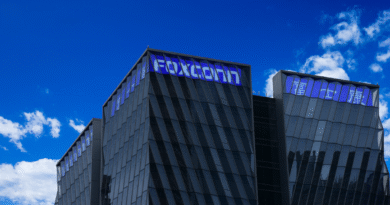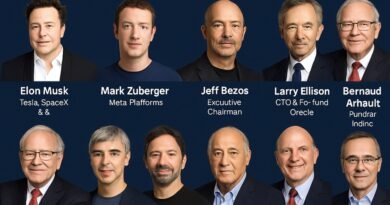How Victoria’s Secret’s Les Wexner Made $2 Billion In 3 Months From AI Giant CoreWeave
In a stunning display of tech-era wealth acceleration, Les Wexner, the enigmatic billionaire behind Victoria’s Secret and L Brands, has turned heads by pocketing $2 billion in just three months — not from fashion, but from CoreWeave, an AI infrastructure startup that has rapidly become a darling of the artificial intelligence boom.
Wexner’s early backing of CoreWeave underscores a dramatic shift among old-guard moguls who are now riding the wave of generative AI profits. This article uncovers how Wexner built his stake, what CoreWeave does, and why this might just be the start of a bigger AI-era investment play.
Who Is Les Wexner?
Leslie H. Wexner, 87, is the founder and former CEO of L Brands, the conglomerate behind brands like Victoria’s Secret, Bath & Body Works, and Abercrombie & Fitch. He built a retail empire that transformed the lingerie and beauty space. Forbes estimates his net worth as of July 2025 to be around $6.5 billion, with a large chunk now tied to private investments.
Key Career Highlights:
- Founded The Limited in 1963.
- Built L Brands, taking Victoria’s Secret global.
- Retired as CEO in 2020 amid brand criticism and Epstein-related scrutiny.
- Now runs private family office via Wexner Foundation and investment arms.
What Is CoreWeave?
CoreWeave is a cloud infrastructure company specializing in AI-focused GPU computing. Originally a crypto mining outfit, CoreWeave pivoted to AI infrastructure and now leases NVIDIA’s high-end chips (like H100 and A100 GPUs) to AI model developers and enterprises needing raw processing power.
CoreWeave Snapshot:
- Founded: 2017 by Brian Venturo, Max Hellerstein, and Michael Intrator
- HQ: Roseland, New Jersey
- Focus: GPU-based cloud computing for AI/ML
- Valuation (as of July 2025): $19 billion
- Backers: Blackstone, NVIDIA, Fidelity, Magnetar Capital
- Customers: OpenAI, Anthropic, and other LLM developers
CoreWeave’s business has surged in the generative AI gold rush, providing on-demand GPU power that rivals and even undercuts the likes of AWS, Google Cloud, and Azure.
Les Wexner’s Stake in CoreWeave: The $2 Billion Windfall
Wexner’s $2 billion windfall traces back to his early stake through an investment vehicle linked to his family office, reportedly buying in before the 2024 funding explosion.
Timeline of Profits:
- 2023: Wexner quietly invests in CoreWeave’s earlier rounds.
- May 2024: CoreWeave raises $1.1 billion in Series C at a $19 billion valuation, led by Blackstone, with contributions from Fidelity and NVIDIA.
- Q2 2025: CoreWeave files for an IPO, and private shares surge in secondary markets.
- July 2025: Valuation climbs; Wexner’s early stake appreciates nearly 1,200% in under 18 months.
According to Bloomberg, Wexner’s holdings — originally valued in the hundreds of millions — are now worth more than $2 billion, on paper, in just 90 days due to secondary sales and markups.
Why CoreWeave Is So Valuable
CoreWeave’s value lies in its ability to deliver low-latency, scalable access to GPUs, especially NVIDIA’s H100s, which are in short supply. Its AI-first cloud model has helped:
- Startups like OpenAI access affordable compute
- Enterprise AI teams avoid building costly infrastructure
- Edge innovators experiment faster with LLMs and diffusion models
The global AI infrastructure market is expected to surpass $100 billion by 2027, with CoreWeave poised to capture a large share.
Wexner’s Strategy: From Retail Tycoon to AI Power Broker
Wexner’s pivot into tech isn’t accidental. With decades of capital markets experience and connections, he’s used private investment channels, hedge funds, and VC partnerships to deploy capital outside of traditional retail.
Key Investment Traits:
- Long-term horizon
- High-risk/high-reward tolerance
- Access to exclusive deals via elite networks
- Smart alignment with emerging tech (AI, cloud)
While Wexner has largely stayed out of the limelight post-retirement, this strategic move into CoreWeave shows he still has the Midas touch — and an eye for transformational industries.
What’s Next for CoreWeave and Wexner?
CoreWeave:
- IPO anticipated by late 2025, with potential listing on NASDAQ
- Likely to cross $1.5 billion in annual revenue by 2026
- Expanding data centers and global presence to meet demand
Wexner:
- May become one of the top private tech investors of the decade
- Could reinvest profits into new AI, biotech, or quantum startups
- Legacy now includes not just retail transformation but tech foresight
FAQs
How did Les Wexner invest in CoreWeave?
Wexner reportedly invested through a private equity or venture fund tied to his family office before CoreWeave’s Series C and valuation spike.
Is CoreWeave publicly traded?
No, but an IPO is expected by the end of 2025.
What does CoreWeave do differently from AWS or Google Cloud?
CoreWeave offers GPU-optimized cloud computing, specifically tailored for AI/ML workloads, at better availability and often lower cost.
Why is this investment significant?
It highlights the cross-industry appeal and profitability of AI, showing that even legacy business titans can earn billions by strategically entering the tech sector.
Conclusion
Les Wexner’s $2 billion gain in just 3 months is a masterclass in strategic investing — identifying a market with explosive potential, backing the right horse (CoreWeave), and knowing when to capitalize. The former retail magnate has now cemented himself as a serious player in the AI gold rush, and his story signals just how fast wealth can be created in the AI-first economy.
Keep Reading:
- Revolut Eyes $1 Billion Raise at $65 Billion Valuation: Europe’s Top Fintech Sets Global Ambitions
- Negotiating Your First Term Sheet: A Founder’s Playbook
- The Founder’s Legal Checklist: 10 Things You Need to Do Before Launching
- Intellectual Property 101: How to Protect Your Startup’s Most Valuable Assets
- xAI, Elon Musk’s AI Startup, Eyes $4.3B Equity Raise at $80B Valuation




